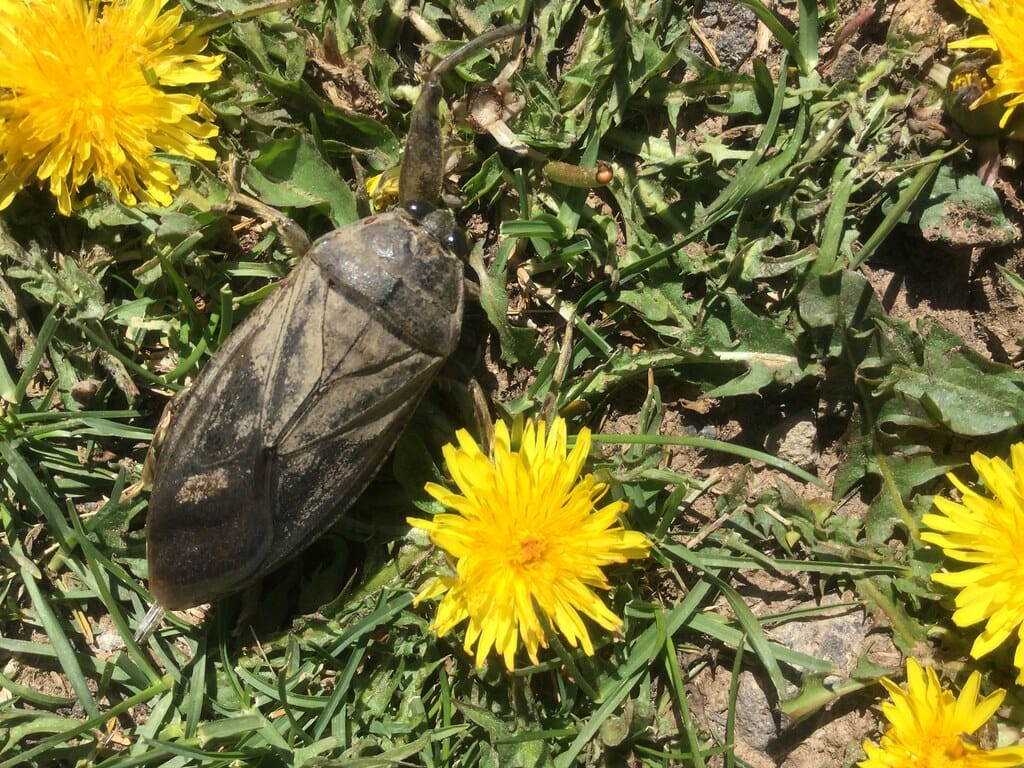Waterbugs are creepy crawlies that seem to appear as if from nowhere when the weather warms up. And there’s nothing like an insect infestation to ruin your wonderful summer activities!
So how on earth do you get rid of these pesky bugs?
The five best ways to get rid of waterbugs are pesticides, traps, essential oils, spraying alcohol or detergents, and using repellants.
While waterbugs are not the most damaging bug to have in your garden, they are certainly not something you want to keep around if you can help it. But don’t worry; we are here to help you through it.
This article is going to dive into the world of waterbugs and give you some super handy tips for ridding your garden of them once and for all.
What are Waterbugs?
Before we get into how to get rid of waterbugs, we need to get to know what we are dealing with a little bit better.
Let’s look at a quick run down before we get started.
| Waterbugs | Specifications |
| Family | Belostomatidae |
| Life Span | 1 year |
| Habitat | Standing water and humid environments |
| Diet | Aquatic insects, amphibians, fish |
These bugs are a family of bugs with over 170 species worldwide, so the specific variety you are dealing with will depend on where you live.
They are 1.5-2 inches long with large wings that fold over a three-part body. They have four larger legs, two smaller front legs, and a pair of sharp pincers. They are brown to grey in color, which sets them apart from cockroaches.
Waterbugs are cold-blooded creatures that love warm temperatures with wet and humid environments. Although the adults cannot breathe underwater, they build their nests near the water and hunt in it.
One of the things that is pretty astounding about these insects is the fact that they eat animals and insects that are significantly larger than themselves, which is what makes them seem so scary. They do this by biting their victim and injecting a toxin that paralyzes them.
Although having a waterbug infestation isn’t ideal, they are not officially considered pests because they do not spread any kind of disease or cause much damage of any kind.
Why Do You Need To Get Rid of Waterbugs?
When it comes to waterbugs, there’s not actually a lot of visual damage caused by an infestation. However, if you are like us, you don’t like cohabiting with a bunch of crawling insects that get in all over the place.
The main areas of infestation for waterbugs are houses and swimming pools or other standing water, like ponds.
An infestation in your pool is bad enough, but if waterbugs get into your home, they can burrow into the walls and create nests. This can lead to them getting into your food cupboards and feasting on your stores.
Even someone who isn’t scared of insects would be put off by the idea of waterbugs living in the walls!
Another factor that really gets to us when it comes to waterbugs is the fact that they bite! Although they might look like cockroaches, they will not run from confrontation. Instead, they will bite if confronted. Their bites are not toxic to humans, but it’s not something you should have to deal with in your own garden.
While this toxin is not harmful to humans, the bite itself will be painful, and it may elicit an allergic reaction in some people. If you are bitten, we recommend wiping the area down with rubbing alcohol and applying a plaster.
So, yes, they won’t cause a crazy amount of damage or spread any diseases, but waterbugs are very unappealing and might even bite you! This is why we recommend getting rid of them as soon as possible.
Signs of a Waterbug Infestation
So now you know why you want to get rid of waterbugs, but how do you know if you have an infestation in the first place?
Waterbugs prefer to live outside in the water, but if you live near water, they could make their way inside. They will not thrive in a house the same way that cockroaches will, but they will be attracted in if your house is humid.
These are the signs to look out for if you suspect that waterbugs have made their way into your home:
- Black streaks- Like cockroaches; waterbugs will leave behind black smears when they leave their droppings.
Check for these marks along your baseboards, and anywhere you may be storing food.
- Shed shells- Waterbugs shed their exoskeletons regularly, which is an easy way to tell that you have waterbugs rather than cockroaches.
You will find these scattered around the areas where they have made their nests, which can be hard to spot because they usually construct them inside interior walls or behind baseboards.
- Activity at night- Since they are nocturnal, it can be hard to pin down whether your culprits are waterbugs.
Our suggestion is to investigate at night after the lights have been off for a while. If you turn the light on and you see them scuttling around, then your mystery will be solved. Just be sure to note their size and color, so you don’t mix them up with cockroaches.
But what about outside? If you have a pool or pond with algae, it’s very likely that you will deal with waterbugs because they like to eat it.
There are also a few signs to look out for that will confirm that this is a waterbug infestation in your garden:
- Shed shells- Like in your house, it’s likely that you will find the shed exoskeletons of the waterbugs in your pool. Check your pool filter for any signs of them.
- Egg casings- Waterbugs will hatch their eggs close to the water, so the egg casings are common to find floating on the surface. They are very small, so you will have to look closely to spot them.
- Black pellets- The final subtle but definite sign that you have waterbugs is their small, black droppings floating in the water.
The best way to keep waterbugs away from your pool is to clean it regularly and ensure that there is no algae buildup. However, this is not an option with ponds, since algae are welcomed in that environment.
That is where our tips come in!
5 Tips to Get Rid of Waterbugs
Now that you have established that you have a waterbug infestation, what can you do about it?
If possible, it’s best to apply preventative measures in late spring to early summer before they emerge from their hibernation and start to reproduce. However, all these methods can be applied at any time.
These are the top five ways that we suggest to get rid of waterbugs in your house or garden.
1. Pesticides
Whether you choose natural or chemical pesticides, they are by far the easiest way to get rid of waterbugs. They are not the most humane, however, if that is something you are concerned about.
These may come in the form of powders, like boric acid, or sprays that might be general pesticides or products that have been specially designed for waterbugs.
Simply spray or sprinkle the pesticide over the bugs or their nests and allow it to take effect.
2. Traps
This is a very handy way to get rid of a whole waterbug colony at once.
The way it works is the trap is loaded with bait that attracts the waterbugs. The bugs then take the bait back to their nest, where they consume it, poisoning the whole colony.
3. Essential Oils
This is the most fragrant solution for getting rid of waterbugs.
Certain scents are very good at repelling insects, and we can use this to our advantage. We recommend using lemongrass, peppermint, and cedarwood essential oils against waterbugs.
If they make direct contact with the oil, it will dry the bug out and eventually kill it, while just the smell itself is enough to repel them.
In the house, you can use an aromatherapy burner, or you can dilute the oil in water and spray it around using a spray bottle.
4. Spraying Alcohol or Detergent
Alcohol and detergents like washing up liquid are also very effective in getting rid of waterbugs
The best way to apply them is by diluting rubbing alcohol or dishwashing liquid in some water and decanting it to a spray bottle. You can spray this over the waterbugs and onto their nests.
The additive will cause the bugs to dry out and die.
5. Repellants
If you are looking for a more humane approach that gets rid of the bugs without killing them, then repellants are the choice for you.
You can buy purpose-made repellants or use diluted vinegar in a spray bottle.
Repellants work by blocking the bugs’ sense of smell and making the area seem unappealing. This should lead to them vacating the area without needing to kill them.
Frequently Asked Questions:
Do water bugs come up drains?
As horrifying as this may seem, it is totally possible for waterbugs to come up through your drains. They love water, so pipes are a great environment for them.
If you use the prevention techniques that we have outlined, you should be able to get rid of this issue.
In particular, we recommend spraying some diluted rubbing alcohol down the drain to try and deter them.
Why are waterbugs getting into my house?
This could be for several reasons.
The first is that the weather is getting cold. As we talked about earlier, water bugs prefer warm temperatures, so if the temperature suddenly drops, they might seek refuge in your house.
The second is that your house is very humid. Waterbugs love humidity, so they may be drawn into your house for this reason. You can remedy this by improving your house’s ventilation.
The third is being attracted to light. During mating season, waterbugs will be attracted to light, which could lead to them getting into your house. To fix this, we recommend turning off your porch light in the summer.
How do I stop waterbugs from coming into my house?
This is a challenging question to answer because there is not a lot you can do besides making your house inhospitable to them.
We suggest getting rid of any unnecessary standing water, improving your home’s ventilation to get rid of any excess moisture, and sealing all food containers.
Apart from this, all you can really do is keep a beady eye out for any critters that may be trying to set up house in your space so you can nip it in the bud as soon as possible.
Conclusion
And there you have it, our top five tips for finally ridding your garden and home of those annoying waterbugs.
Although these biting creatures are not harmful to humans, they are not pleasant to have hanging around your garden. Luckily, whether you choose to use preventative methods like essential oils or vinegar or go the whole way and buy a pesticide, there is a multitude of easy ways to get rid of waterbugs so you’ll never have to deal with them ever again.
Good luck with your waterbug problem; if you follow our guidance, they should be gone in no time!





